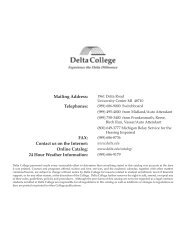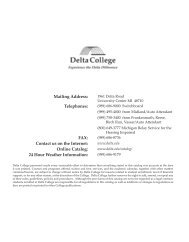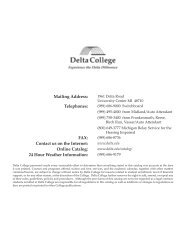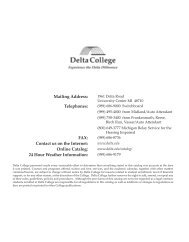2012 - 2013 catalog - Delta College
2012 - 2013 catalog - Delta College
2012 - 2013 catalog - Delta College
You also want an ePaper? Increase the reach of your titles
YUMPU automatically turns print PDFs into web optimized ePapers that Google loves.
CJ 135W Correctional Institutions and<br />
Facilities<br />
3 Sem Hrs<br />
Prerequisite: READING LEVEL 1 or WRITING LEVEL 1. Provides an<br />
overview of correctional institutions and facilities. Covers topics including<br />
the purpose of prisons and correctional institutions, treatment and<br />
rehabilitating programs, management and organization of correctional<br />
institutions, custodial care, safety and security, and future concerns. (45-0)<br />
CJ 150 Introduction to Emergency Dispatch 1 Sem Hr<br />
Introduces the history, structure and roles of the emergency dispatch<br />
center. Explains major responsibilities and skills needed for career as<br />
emergency telecommunicator. Examines associated legal and social issues<br />
and offers resolutions to stress and burnout issues related to field. (15-0)<br />
CJ 182W Introduction to Security 3 Sem Hrs<br />
Prerequisite: READING LEVEL 1 or WRITING LEVEL 1. Introduces<br />
the field of security and orients student to career options. Explores<br />
origins and development of security, proprietary security, risk analysis,<br />
fire protection, safety, internal theft control, insurance cargo security,<br />
computer security, institutional security, and the future of security. (45-0)<br />
CJ 187W Current Issues in Security 3 Sem Hrs<br />
Prerequisite: READING LEVEL 1 or WRITING LEVEL 1. Surveys current<br />
issues in security: terrorism, espionage, substance abuse, employee theft,<br />
computer vulnerabilities, and protection of information. (45-0)<br />
CJ 210W Introduction to Criminal<br />
Investigation<br />
3 Sem Hrs<br />
Prerequisite: READING LEVEL 2 or WRITING LEVEL 2. Introduces<br />
criminal investigation procedures: theory of an investigation, conduct at<br />
crime scenes, collection and preservation of physical evidence, methods<br />
used in police science laboratory, finger prints, ballistics, documents,<br />
serology, photography, and related forensic sciences. (45-0)<br />
CJ 211W Private Security and Investigative<br />
Methods<br />
3 Sem Hrs<br />
Prerequisite: READING LEVEL 2 or WRITING LEVEL 2. Introduces<br />
private security and investigative methods, including public record<br />
searching, surveillance, background investigations, interviewing<br />
techniques, fair credit reporting act, computer based investigations and<br />
video evidence. (45-0)<br />
CJ 215W Introduction to Homeland Security 3 Sem Hrs<br />
Prerequisite: READING LEVEL 2 or WRITING LEVEL 2. Explains the<br />
basic concepts of homeland security. Examines domestic and foreign<br />
terrorist violence aimed at achieving radical change in society. Explores<br />
governmental reaction to homeland security needs and threats against<br />
interests of the United States. (45-0)<br />
CJ 220W Crime Laboratory Techniques 3 Sem Hrs<br />
Prerequisite: READING LEVEL 2 or WRITING LEVEL 2 and CJ 210<br />
with a “C” or better. Introduces scientific criminal investigation and<br />
criminalistics: proper handling and transmittal of evidence to the crime<br />
laboratory, laboratory aids that are available, and understanding of the<br />
probabilities related to examination of physical evidence. (45-15)<br />
CJ 233W Client Growth and Development 3 Sem Hrs<br />
Prerequisite: READING LEVEL 1 or WRITING LEVEL 1. Explores the<br />
various factors involved in the development and growth of the criminal.<br />
Discusses the biological, environmental, and psychological influences.<br />
Reviews specific problems such as sexual, substance abuse and medical<br />
disorders. Explores intervention strategies. (45-0)<br />
CJ 237W Jails & Local Detention 3 Sem Hrs<br />
Prerequisite: READING LEVEL 2 or WRITING LEVEL 2 and CJ 110<br />
or CJ 130 with a “C” or better. Explains the operations of jails and<br />
local detention facilities and their unique role in the criminal justice<br />
system. Covers Michigan jail and lockup operations, as well as their<br />
organization, management, and emerging issues confronting American<br />
jails. Reviews differences in jails and prisons regarding operations and<br />
differing clienteles. (45-0)<br />
CJ 238W Legal Issues in Corrections 3 Sem Hrs<br />
Prerequisite: READING LEVEL 1 or WRITING LEVEL 1. Studies the<br />
primary legal issues correctional personnel will be entrusted to enforce<br />
and safeguard. Covers an overview of U.S. Constitutional law, the court<br />
process from arrest through trial, the structure and function of the S.S.<br />
and state courts, and prisoner rights. (45-0)<br />
CJ 250 The Juvenile Offender 3 Sem Hrs<br />
Prerequisite: READING LEVEL 2 or WRITING LEVEL 2. Studies theories<br />
of causation as applied to juvenile delinquency. Examines the work of<br />
youth agencies. Explains Michigan Juvenile Law and constitutional<br />
safeguards for juveniles. Reviews new development in the prevention<br />
of juvenile crime. (45-0)<br />
CJ 253 Emergency Dispatch Operations 3 Sem Hrs<br />
Prerequisites: CJ 112, CJ 150, FST 101, SPH 212. Introduces the<br />
mechanical, technical, and general operations of an emergency dispatch<br />
center. Orients to call-taking and radio dispatching utilizing technical<br />
equipment such as multi-line phone systems, wireless technology, waves<br />
and frequencies, various computer systems, and generally accepted<br />
operational procedures. Discusses various resources available and<br />
utilized by emergency dispatchers.(45-0)<br />
CJ 270W Evidence and Criminal Procedure 3 Sem Hrs<br />
Prerequisite: READING LEVEL 2 or WRITING LEVEL 2 and any one<br />
course from the Criminal Justice Discipline or any POL 103, POL 104,<br />
or POL 212 course with a “C” or better or permission of the instructor.<br />
Studies the rules of evidence as it affects the criminal justice process.<br />
Includes an overview of criminal procedure as it pertains to the rules of<br />
arrest, search, and seizure, which regulate law enforcement, and protects<br />
citizen’s rights of privacy and presumed innocence. (45-0)<br />
CJ 271W Criminal Law 3 Sem Hrs<br />
Prerequisite: READING LEVEL 2 or WRITING LEVEL 2 and any one<br />
course from the Criminal Justice Discipline or any POL 103, POL 104,<br />
or POL 212 course with a “C” or better or permission of the instructor.<br />
Examines elements and proof in crime of frequent concerns in law<br />
enforcement with reference to principal rules of criminal liability.<br />
Considers importance of criminal law at the enforcement level, from<br />
crime prevention to courtroom appearance. (45-0)<br />
CJ 275W Probation and Parole 3 Sem Hrs<br />
Prerequisite: READING LEVEL 2 or WRITING LEVEL 2 and CJ 130<br />
with a “C” or better. Examines the process of probation and parole.<br />
Emphasizes management and supervision of individuals involved in<br />
the probation and parole process including interviewing, counseling<br />
techniques, and preparing court reports such as progress reports and<br />
pre-sentence investigations. (45-0)<br />
CJ 280W Internship in Criminal Justice 3 Sem Hrs<br />
Prerequisite: Minimum 15 credits Criminal Justice courses and permission<br />
of faculty. Field placement in a criminal justice setting (police department,<br />
court, juvenile center, etc.). An attempt will be made to find field education<br />
placements compatible with students’ interests and agency needs. (10-160)<br />
CJ 282 Internship in Emergency Dispatch 3 Sem Hrs<br />
Prerequisites: CJ 253. Provides experience in day-to-day operations of<br />
varied emergency dispatch centers. Provides 24 hours of work experience<br />
at an approved emergency dispatch center, followed by 24 hours of<br />
work experience at a second approved emergency dispatch center.<br />
Requires working a varying shift rotation to experience a variety of job<br />
responsibilities as assigned by each emergency dispatch site. Provides<br />
work experiences as active emergency dispatcher during the course of the<br />
internship. Must have approval from the program coordinator prior to<br />
beginning internship at either selected site. Must also pass a background<br />
check by the interning agency and/or fulfill any other predetermined<br />
process required by the department. (0-45)<br />
CJ 290-299<br />
Special Projects in Criminal<br />
Justice<br />
<strong>Delta</strong> <strong>College</strong> <strong>2012</strong>-<strong>2013</strong><br />
Prerequisite Levels - See charts in this section.<br />
355











